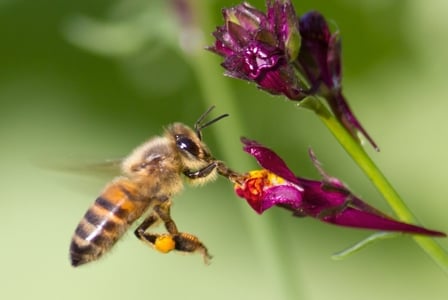
Whats the latest buzz on honeybees? On this Wildlife Wednesday, learn how we can help protect these powerful pollinators.
We might think of honeybees as just another summer pest, like mosquitoes or wasps, but these bees play an essential role in our global ecosystem. Certain crops, for example, wouldn’t exist without the pollination power of helpful honeybees. Sadly, these harbingers of warm weather are dying off by the thousands.
Habitat
Honeybees can be found in hives around the world—and probably even in your own garden.
Bee basics
- Honeybees are responsible for many of our favourite natural health products, including bee pollen, royal jelly, beeswax, and—you guessed it—honey!
- A single pound of honey is the result of 556 worker bees’ collective efforts.
- Honeybees communicate the direction and distance of nearby nectar by dancing.
- The average colony consists of one queen, several hundred drones (male bees), and 60,000 or more worker females.
- The queen is responsible for populating the entire colony and may lay 2,000 eggs in a single season. No pressure or anything!
- What happens if a queen dies? Well, that’s where royal jelly comes in. When a regular worker bee consumes a diet of this fertilizing elixir, she develops into a queen.
What’s the latest buzz?
Due to their wide range, honeybees aren’t considered endangered; however, there’s little doubt that their numbers are declining.
Between 2012 and 2013 in Canada, we lost almost 30 percent of our beloved bees. Scientists are still baffled by the mass die-off of honeybees, termed colony collapse disorder (CCD). Several possible culprits have been pointed out, including bee-killing pathogens and environmental stressors. A particularly strong link has also been drawn between bee mortality and insecticide use.
More research is needed to really get to the bottom of the honeybees’ plight. In the meantime, we can help protect our pollinating pals by ensuring that our gardens are bee friendly. This means forgoing pesticides and using organic products whenever possible. We can also grow nectar- and pollen-producing plants such as red clover, foxglove, and bee balm.
Interested in going a step further and housing bees in your garden? Our article, “Mason Bees,” will show you how to care for this close cousin of the honeybee.

